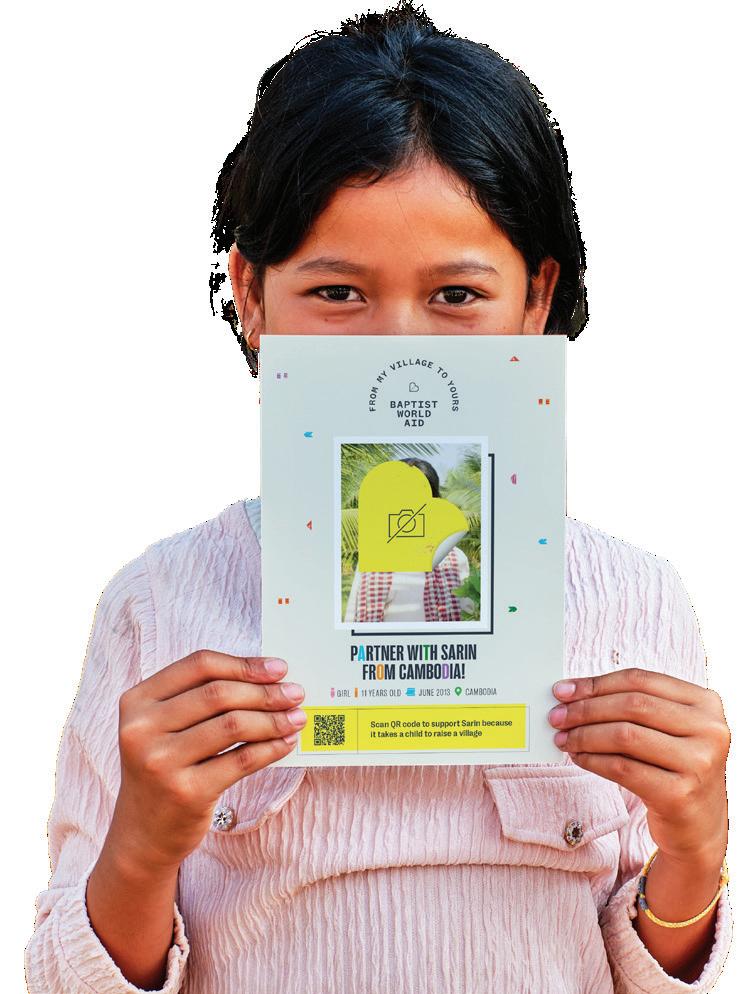BETTER WORLD











When women are given economic power, vulnerable communities benefit profoundly.
At Baptist World Aid, we have a particular focus on ensuring women are fully included within the life of their community. While this is fundamentally about equality, justice, and dignity for all people, investing in girls and women makes economic sense for us and our Partners, families and communities.
I’ve had the privilege of sitting among women’s self-help groups where so much of this good work happens. I regularly meet women like Urmila from Nepal (pictured above), who went from financial poverty to running a thriving business that supports her family. You can read more about these groups on page 6 and the way their members—both men and women—work together with our local Christian Partners to grow in their capacity, and learn and teach others the keys to financial stability.
Knowledge really is power. As people become more aware of unjust systems that work against freedom, dignity and equality, they can make changes that disrupt the cycles that bind people to poverty. We also have that power, knowing that the choices we make impact others around the world.
Our clothing purchase decisions can make positive, far-reaching changes, so don’t miss our feature on page 10 where we investigate what’s needed to help bring positive change at each point in the fashion supply chain. And be encouraged on page 12 by Carey Baptist College in Western Australia, helping students consider their power and responsibility as consumers of items often made by the world’s most vulnerable.
God cares about the way we use our money and resources because it reveals something of our love for him and our neighbours. Turn to page 14 as Robert Ellis from Baptist Financial Services helps us think this through by answering our Curly Question, ‘Is money the root of all evil?’
And as we dive into this issue, let’s remember, where our treasure is, there our heart will be also (Matthew 6:21).
Because of Jesus,

Melissa Lipsett CEO Baptist World Aid
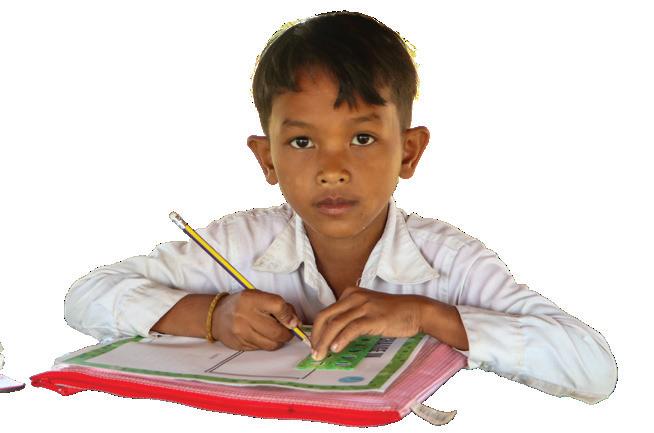
In a small Cambodian village, Chea’s life took a transformative turn when his mother registered him in our Partner’s Child Club. Previously, Chea (pictured above) grappled with shyness and fear. He found it difficult to engage with peers at school and lacked the confidence to participate in activities.
But through the support he received and activities at Child Club, Chea began to flourish. Participating in drawing, writing letters, and attending Child Club sessions helped Chea discover his strengths and build his self-esteem. ‘After becoming a child partner, I grew so much,’ Chea said. ‘Now I understand about child rights. I love planting trees and taking care of my own body.’
The impact of the project on Chea’s life is evident in his newfound confidence and independence. He has become more obedient, socially adept, and eager to learn. He’s also a talented artist! ‘My child is more courageous than before,’
Chea’s mother said. ‘He dares to raise his hand to ask the teacher what he does not understand.’
Beyond personal growth, Chea has plenty of aspirations for his community’s future. ‘I’m glad that there are opportunities for children to learn and understand health, education, and other technical aspects of growing vegetables to improve their daily life in my community,’ he said.
Education is one of the best ways for children to break the cycle of poverty and pave a better future. Our Partner recently supported 86 teachers in Nepal to implement collaborative learning methods in their classrooms. Using an activity-based learning approach, the teachers have helped 8,929 students (including 70 children with disabilities) acquire life skills such as social interaction, doing their homework, taking part in sports, and maintaining their hygiene.
PEOPLE were directly supported during the COVID pandemic through our Partners.
In August, Baptist World Aid was thrilled to join Micah women leaders to advocate for vulnerable global communities as part of the Safer World for All Campaign. CEO Melissa Lipsett and Director of International Programs Fiona Smith spent the day with other women Christian leaders, meeting with politicians to advocate for an increase to our International Aid budget from 0.68% to 1% of total government spend.

Since the earthquake in Türkiye and Syria, millions of people have been struggling with displacement and mental trauma. Along with meeting practical needs, our Partner has been helping people build their resilience, with 10,799 people accessing mental health services, and 19,531 taking part in mental health awareness sessions. Staff members also participated in training workshops to develop their skills in best practice mental health care.
Our Partners provided food for 16,981 PEOPLE in Ukraine through mobile kitchens.
Conflict in the Middle East has led to cross-border shelling in South Lebanon and displaced over 500,000 people from their towns and villages, with numbers still rising. Our Baptist Partner is working with local churches to support these families with basics such as food, mattresses, blankets, and hygiene items. Church volunteer Claudette said, ‘this time, the need is huge, but they are providing everything they can and we are thankful for their support.’
‘Please pray for our team, that we would truly reflect Jesus’ image to the people we serve.’
—CLAUDETTE, CHURCH VOLUNTEER IN SOUTH LEBANON
Clean water was hard to come by in a Northern Ugandan village, with only two borehole water taps for 480 households. Many families had to walk 8km to the boreholes and use unsafe water from the nearby stream. Our Partner provided the community with an additional borehole in their area, along with training on water management and tap repairs. Now, 100 families have a water source nearby and their lives have changed. People aren’t getting sick from drinking stream water, women have more time to tend to their produce and chickens, and children aren’t spending hours collecting water before school.
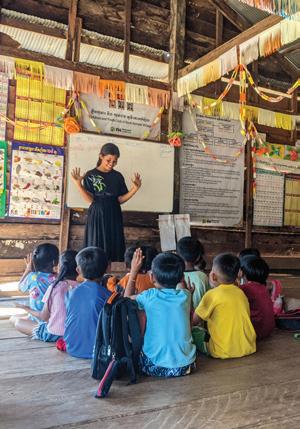
One of our Partner’s projects in rural Cambodia helps build communities where children and youth are safe and encouraged to thrive. They’ve been training young people in life skills, including 14-year-old Chanlina (pictured above). Before the project, she was extremely anxious and reluctant to engage with other children. Now, she’s a volunteer teacher at the Child Club! ‘I would like to see Cambodian citizens place a high value on education,’ she said.
YOUTH in one of our Partner’s projects in Nepal have secured new jobs, thanks to their skills training.
Currently, 350,000 civilians in Gaza with chronic illnesses have extremely limited access to their medications due to ongoing conflict. Our Partner has provided 14 shipments of medical supplies and medicines to treat 50,611 people with chronic conditions such as diabetes and hypertension. They’re also running clinics to provide patients with medical care, and have so far cared for 380 patients with chronic conditions and 617 patients with injuries.
Conflict in Myanmar means many families are living in displacement camps where it’s hard to meet their needs. Our Partner is providing supplies such as food, water tanks and weaving looms so women can earn an income. A visiting staff member recently noted the sense of cooperation in the camps. ‘Those who are elderly and unable to work receive support from the community,’ she said.
◀ Give monthly and become a Better World Ambassador today. bwaa.co/bwambassador
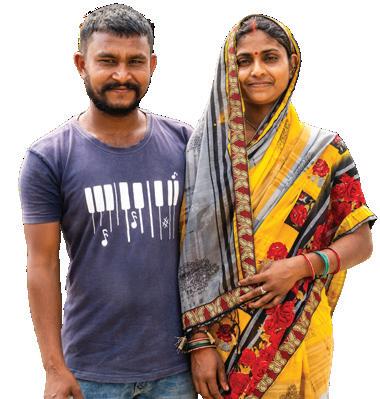


By Heather Keith
Financial literacy is largely denied to people living in poverty—for generations.
Are you ‘good with money’?
If you were trying to run a business with very little financial education, how would you know if your business was going well, whether you were making a sound investment or if someone was taking advantage of you? You might end up working hard and getting nowhere.
Thavorn (pictured above) farms a small property in Cambodia with his wife, Toun, to support their family. At times, especially during prolonged dry periods, the family struggled to produce enough to meet their needs, so a loan seemed like a good solution. But Thavorn didn’t realise he’d agreed to an unreasonably high interest rate and his debt soon multiplied.
Financial literacy is largely denied to people living in poverty—for generations.
And for people like Thavorn, the absence of these skills exacerbates the cycle of poverty—for generations.
Financial literacy has four pillars: debt, budgeting, saving, and investing. When all four are addressed, alongside other training and assistance, people build strength to advocate for themselves and carve their own way out of poverty.
Nathan Sarker, Baptist World Aid’s South Asia Regional Lead, works closely with our local Christian Partners, particularly in Bangladesh, who develop programs addressing these challenges. He explained where financial literacy fits within community development.
‘It’s very important,’ Nathan said. ‘Our approach is to help vulnerable people fill the gaps in
their education so that they have the skills needed for success in life. We call it “functional education” and that includes financial literacy.’
Very often, our local Christian Partners provide this education through self-help groups. These groups—often gender-specific—are selfgoverning entities made up of representatives from families within the community. And the groups have several functions, including providing a safe space to share challenges and gain wisdom from each other. This is particularly important for women living in contexts where gender-based violence and discrimination are common. Together, they learn skills such as new agricultural methods or financial literacy, and work as a team on solutions to community-wide problems and to create a savings fund.
‘It’s designed to be self-led and sustainable,’ explains Nathan. ‘Each amount contributed is carefully recorded by the group’s treasurer, so members see their savings grow. These funds can then be lent to members—with an agreed interest rate and repayment schedule—to do things like buy animals or seeds so they can invest in their business. It creates a safe space for people to practice using their new-found knowledge.’
Self-help groups have elected roles such as president and treasurer, and the members leverage their collective strengths to support each other and build up the community. Through this approach, communities find creative and sustainable solutions to financial problems—both personal and community-wide—and continue to function long after supporting organisations have withdrawn from the region.
‘When people start learning about finance, they are assessed and sometimes put into streams according to their existing knowledge,’ said Nathan. ‘As people progress, they move from basic numeracy to balancing a budget, to perhaps becoming treasurer of their self-help group, and eventually creating or developing their own business.’
Often, after people are finished with the program, they become so capable with finances that they become trainers for other
self-help groups. In this way, knowledge is passed around the whole community and everyone can gain the skills needed to thrive.
Thavorn and Toun are now managing their finances well and they are growing their farm, paying off the loan, and serving their community.
Our approach is to help vulnerable people fill the gaps in their education so that they have the skills needed for success in life.
—NATHAN SARKER
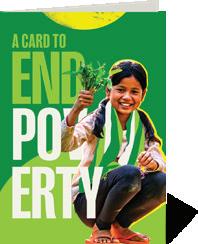
Our Veggie Patch Card helps provide agricultural and business training so people can earn an income and fight poverty. bwaa.co/gift-hope
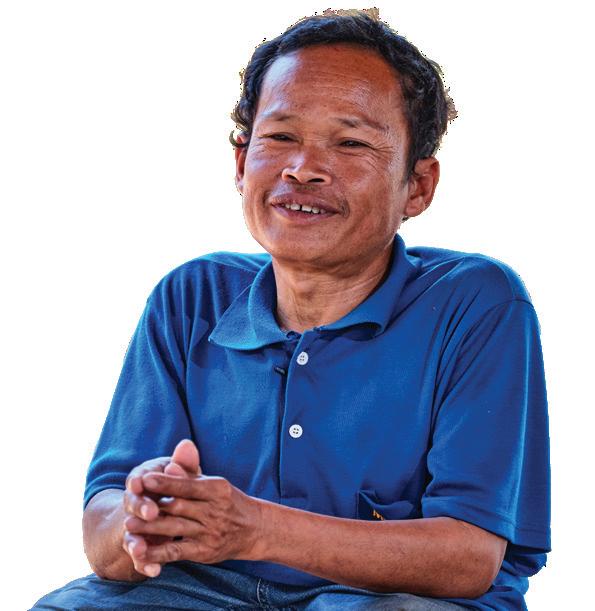


▲ Malawi: Baptist World Aid team member Rochelle recently met youth who volunteered to build a community health clinic as part of their vocational bricklaying training.
▼ Uganda: An orthopaedic specialist fits Timothy with a prosthetic leg and teaches him how to use it. Now, Timothy can play with other children and take himself to school.

◀ Bangladesh: This women-led farmers group is supported by our Partner’s project, which helps remove barriers to earning a livelihood.
▼ Bangladesh: Our Partners take part in a climate change training session, and learn about ways to mitigate its impact on communities and the environment.



▲ Syria: Our Partners provide essential items for families still struggling in the aftermath of the February 2023 earthquake.
▼ The Solomon Islands: Partner team leaders Tom and Florence coordinate a program for 51 villages, helping people in the community improve their sanitation, water supply, literacy and health.


It takes an immense amount of water to grow, extract and process raw materials into clothing textiles, such as cotton. In Bangladesh, garment factories and mills use 1,500 billion litres of water each year, straining the country’s groundwater resources. Textile processing and dyeing also pollutes waterways with hazardous chemicals. One study found per- and polyfluoroalkyl substances (PFAs) in 27 water samples collected close to textile factories in Dhaka, Bangladesh. PFAs are known as ‘forever chemicals’ because they remain in the environment for centuries.
Companies should steward water wisely, rigorously measure how much water is used at their facilities (especially at the raw material stage), and set goals to use less. They should also regularly test the presence of chemicals in their processes, and avoid using chemicals on the Manufacturing Restricted Substances List. As a consumer, you can do your part by choosing clothes made from fibres that have a lower environmental footprint. For example, certified organic cotton uses no toxic chemicals and 88 per cent less water in the manufacturing process compared to conventional cotton.

As little as two per cent of the people who make your clothes earn a living wage—the minimum amount needed for basics like food and housing. Those who don’t earn enough are forced to skip meals, take on debt, or pull their children out of school to survive. A 2023 report found 65 per cent of surveyed workers in Cambodia didn’t earn enough to last until the end of the month. Garment workers also labour in dangerous conditions, from poorly maintained buildings to lack of safety equipment, and are often denied rights such as overtime pay.
Companies should calculate the living wage in the region where their clothes are manufactured, and ensure workers in their supply chain are paid at least this amount. They should protect labour costs during order negotiations with suppliers so workers’ wages aren’t compromised. They should also use independent factory audits to check that workers are being paid and treated fairly, and hear from workers themselves on what their working conditions are like. Use our Ethical Fashion Guide to see if a brand is paying their workers a living wage. If they’re not, urge them to change their practices with our Speak Out To Brands tool.
Our clothes are part of a global system that causes harm to workers, their families, and the environment. But together, we can change this. Here’s a snapshot of how our clothes are made, the issues involved, and what all of us—fashion brands, global citizens and policymakers—can do to promote justice and care for God’s creation.

The rise of ultra-fast fashion means that to keep up with ever-changing trends and consumer demand, companies pressure their suppliers to produce garments at a faster rate and for a cheaper price. Purchasing practices like providing a short lead time for orders, making last-minute changes or bargaining prices down, mean suppliers resort to measures that create unjust conditions for workers. To fulfil orders, workers are often forced to work long hours of overtime without pay, go without sick leave, or to accept a wage that does not cover their needs.
It’s not enough for fashion companies to demand ethical behaviour from their suppliers. Companies that protect workers are committed to Responsible Purchasing Practices (such as fair payment terms), that enable fair treatment of everyone in the supply chain. Ask your favourite brands whether they are committed to Responsible Purchasing Practices, and choose carefully when buying from fast fashion brands.
Find out how your favourite brands scored in this year’s Ethical Fashion Report & Guide. bwaa.co/fashion-resources

Each year, 92 million tonnes of textile waste is produced. Man-made textiles can take over 200 years to decompose, releasing greenhouse gases into the atmosphere and toxic chemicals and dyes into the soil and groundwater. Textile waste is mostly exported to regions like Sub-Saharan Africa, including unwanted donations to charities. In Ghana, one of the largest importers of textile waste, 100 tonnes of clothes are thrown away each day. Around 30 per cent is collected by the city; the rest ends up in illegal dumps or drains, causing damage to waterways and beaches.

Reducing textile waste means reimagining the way we think about our clothes: from rapid consumption and disposal to buying less and making items last, then repurposing, re-gifting or recycling them when we’re finished. Consider whether you need an item before you buy it. Can you make, reuse or repair what you already have, borrow from a friend, or repurpose something you already own? Being mindful about how we consume and treat our clothes is a way of stewarding the resources God has given us.

By Meredith Benson
‘We wanted students to think about how their purchasing power can be a driver for change’
—KATHERINE LOCKWOOD
It’s easy to feel overwhelmed by the numbers. Australians are buying too many clothes (around 56 items a year), and we’re throwing too many of them away, with 200,000 tonnes ending up in landfill each year, and one in four Australians throwing a garment out after a single wear.
This year’s Ethical Fashion Report is as rigorous a deep dive into the global fashion industry as ever. Reading it, two key things stand out—we remain, as human beings, both the problem and the solution.
Our report highlights the need for companies and governments to play their part in addressing issues in the supply chain and implementing policies that protect workers and the planet. But we can easily come back to a place of overwhelm, asking ‘What can we do?’
The young people at Carey Baptist College, Harrisdale in Western Australia had the opportunity to explore this question recently. Year 11 and 12 took part in a Leadership Summit, where the theme was, ‘Everyday Leaders—Global Change’
Led by Ed Devine (pictured above), Baptist World Aid Church Partnership Manager, students learned about the injustices in the global fashion industry, ethical purchasing, and how our individual choices can influence an entire industry.
Katherine Lockwood, Head of the Belief and Values Department at Carey Baptist College, Harrisdale, said the aim was to show students that ‘even when the issues in the world feel overwhelming and even existential, there are things they can do that make a difference.’
‘We wanted students to think about how their purchasing power can be a driver for change.’
For others, creating a positive impact with fashion is a fun social affair. In October, 104 people around Australia ran a Baptist World Aid Swaptober event, which encouraged us to ‘swap instead of shop’ and host a clothes swap.
Our Ethical Fashion team, in partnership with Northside Baptist, kicked-off the month with a clothes swap in the church. ‘Hosting a clothes swap feels like a great way to beat consumerism at its own game!’ said Gina Snodgrass (pictured right), Baptist World Aid Advocacy Specialist. ‘Everyone gets to pick up some new-to-you items while passing on old clothes with plenty of life left in them. And we’re putting the brakes on the cycle of overproduction, overconsumption and waste.’
According to attendee Victoria Barfield, the event fostered a great sense of community: ‘I spent a lovely morning chatting and hanging out with like-minded people, while finding some great new items and feeling good about knowing clothes I’ve loved were getting a new life.’ Alexander Smith, another attendee, said, ‘it was a good wake up call to the impact of the fashion industry, and it felt great swapping my clothes rather than sending them to landfill!’
At the Leadership Summit, students at Carey Baptist College also learned about the impact of consumption on people and the planet in an interactive and powerful way. Students took part in a simulation game, role-playing the life of a garment worker in Bangladesh. As the simulation devolved— with some students resorting to corruption, and others giving up altogether—it led to interesting conversations about how, when the system is stacked against people, it can lead to unjust cycles of powerlessness that feel insurmountable.
‘We live in a world driven by materialism,’ Ed said. ‘It’s great to see young people asking, “How can we live differently, reflect Jesus, and make choices that contribute to a better world?”’
While Carey Baptist College includes students of many faiths, and no faith, days like these show that faith in Jesus impacts every choice we make.
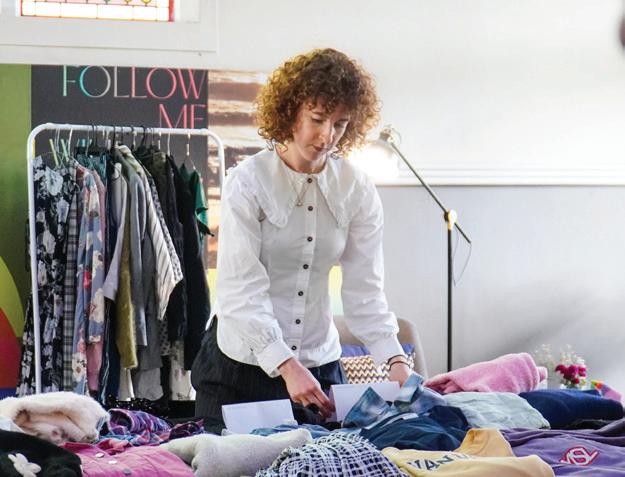
One way we can reduce our consumption is to use these simple steps by author and psychologist, Shakaila Forbes-Bell, to change our shopping habits. When we’re thoughtful about our choices, we’ll get more use out of the clothes we own, and be less likely to purchase stuff we don’t need on an impulse.
4
3
2
1
Can you see yourself in this garment in four years?
Can you wear it in three different contexts?
Pause. Take two deep breaths before making a decision.
Give it one night’s sleep. In the light of a new day, you may feel differently and defer the impulse buy!
You might like to add this reminder to the list: ‘See how the flowers of the field grow. They do not labour or spin. Yet I tell you that not even Solomon in all his splendour was dressed like one of these. If that is how God clothes the grass of the field, which is here today and tomorrow is thrown into the fire, will he not much more clothe you?’ (Matthew 6:28-30)
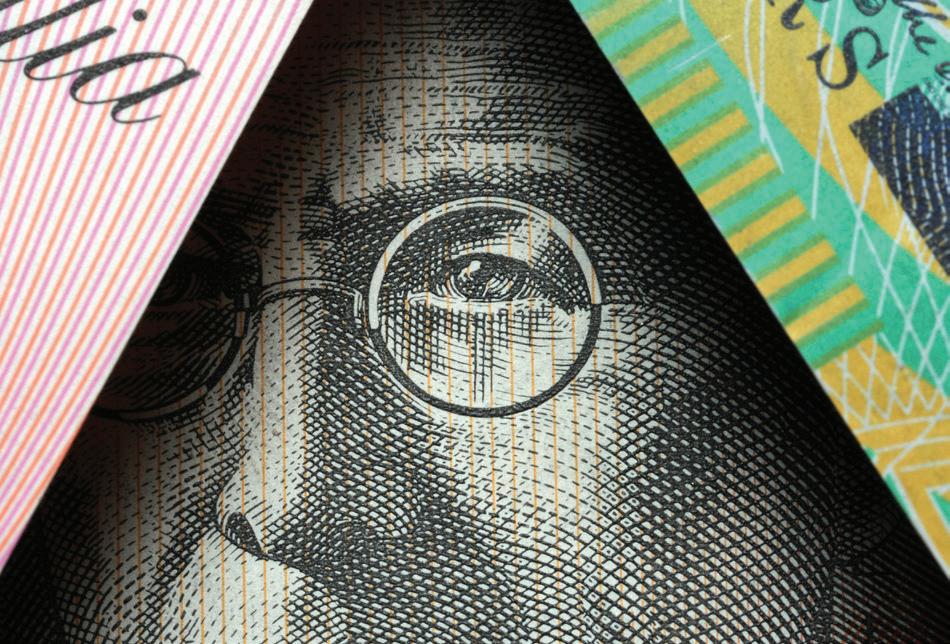
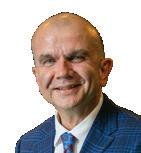
Where our hearts are focused, our money will flow.
The famous phrase ‘money is the root of all evil’ is a misquote. The actual verse, 1 Timothy 6:10, states, ‘For the love of money is a root of all kinds of evil.’ Money itself is not the problem. Rather, what’s in focus here is loving and accruing wealth to the effect that it erodes our love of God, and our neighbour—including our global neighbour.
Christians don’t set out to do this, but it’s easy to slip from good stewardship into a position of holding too tightly to earthly treasures. When this happens, our world becomes smaller and self-obsessed.
The grace-filled renovation of our heart enables us to use money well as an overflow of divine love, moving towards others for their good. Dallas Willard in his book, The Divine Conspiracy: Rediscovering our Hidden Life in God, wrote, ‘Jesus does not call us to do what he did, but to be as he was, permeated with love. Then the doing of what he did and said becomes the natural expression of who we are in him.’
All human beings are made in the image of God and are intended to be God’s representatives, so what we do with our money matters to God. When we
use our money to invest in ministry, care for the vulnerable or in other ways be Jesus’ hands and feet in the world, we live out our calling as ambassadors of Christ. As Jesus says, ‘For where your treasure is, there your heart will be also’ (Matthew 6:21).
For Christians, good stewardship means considering your own family’s needs alongside those of our local community, and your broader neighbours who often live with much less.
Through informed prayer and giving, we can partner with Christian organisations and their global network to put our money to work and do good in the world that advances the Kingdom of God. I visited community savings groups in South Asia and was in awe of people who were assisting others and transforming their lives and community through small loans.
The grace-filled renovation of our heart enables us to use money well as an overflow of divine love, moving towards others for their good.
—ROBERT ELLIS
Every act of giving, in love, partners with Jesus to advance the kingdom of God. Our hearts are deeply moved by global poverty and the injustice that grips so many lives, yet with our money, we exercise our faith like a grain of mustard seed and see the divine transformation that shifts mountains of impossibility (Matthew 17:20). How might you use money for good?
Robert Ellis is the National Relationship Manager for Baptist Financial Services Australia.

‘They all gave out of their wealth; but she, out of her poverty, put in everything— all she had to live on’ (Mark 12:44).
Take a moment to read the story of the widow and her offering in the context of Mark 12:34-44. What do you notice?
We know it as the story of the widow’s mite or the widow’s offering; that is, of the husbandless woman who dropped two small coins into the moneybox in the temple courtyard as Jesus, the Lord of the universe, looked on.
Jesus had visited the temple during the busiest time of the year with his disciples, sitting on a bench, watching and observing and teaching on the quirks and qualities of the people who passed them. That he noticed the woman at all reflects his heart for those who lived on the margins. That he then held her up as a model of generosity reveals more of his desire for our lives—that we hold onto nothing that might keep us from the service of God.
◀ SCAN HERE TO READ THIS REFLECTION IN FULL ON OUR WEBSITE: BWAA.CO/DEVOTIONAL
After you sign up to become a Sponsor, you’ll then receive photos of the child or youth you’re supporting.

Become a Sponsor today.
BWAA.CO/SPONSOR-TODAY
